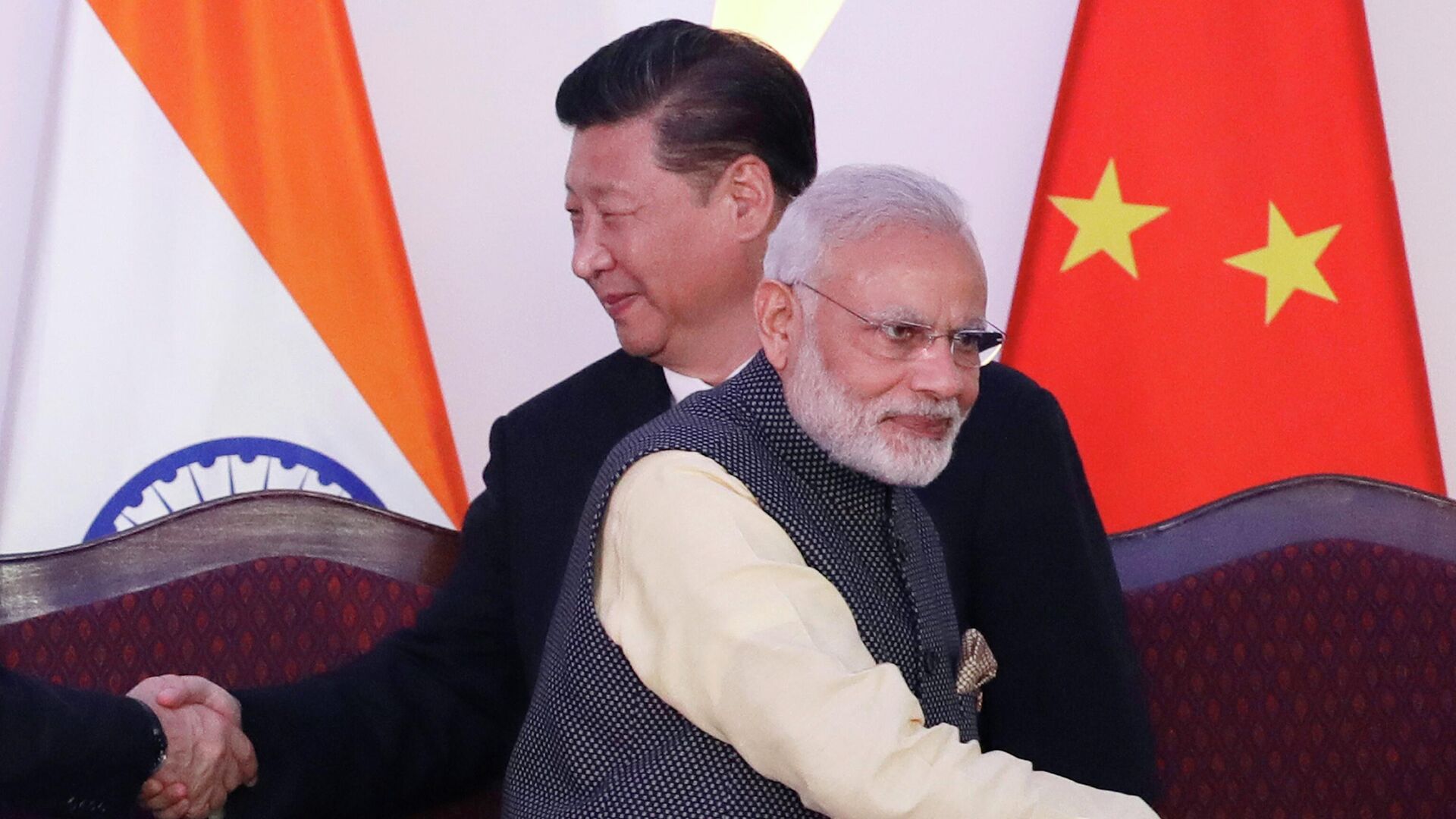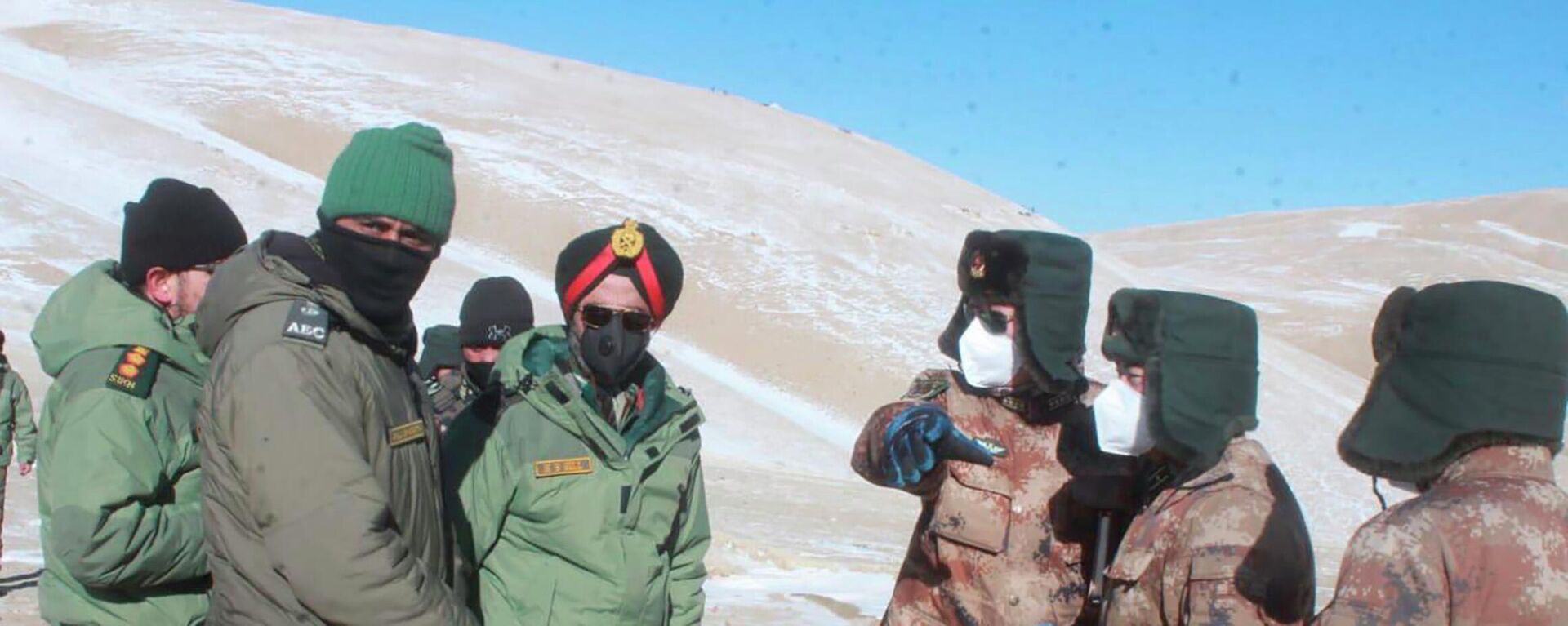https://sputniknews.in/20230727/modi-xi-spoke-on-the-need-to-stabilize-sino-india-ties-in-bali-mea-3238319.html
Modi, Xi Spoke on the Need to ‘Stabilize’ Sino-India Ties in Bali: MEA
Modi, Xi Spoke on the Need to ‘Stabilize’ Sino-India Ties in Bali: MEA
Sputnik India
Indian Prime Minister Narendra Modi and Chinese President Xi Jinping spoke on the need to “stabilize” the overall bilateral relations at the G-20 Summit in Bali last November.
2023-07-27T20:37+0530
2023-07-27T20:37+0530
2023-07-27T20:37+0530
ladakh standoff
xi jinping
narendra modi
india
china
ministry of external affairs (mea)
ladakh
people's liberation army (pla)
brics
https://cdn1.img.sputniknews.in/img/07e7/07/1b/3242895_0:0:3071:1728_1920x0_80_0_0_7019a83cb68457b68562164f4314ff09.jpg
Indian Prime Minister Narendra Modi and Chinese President Xi Jinping spoke on the need to “stabilize” the overall bilateral relations at the G-20 Summit in Bali last November, the Ministry of External Affairs (MEA) spokesperson told a weekly briefing on Thursday.Previously, New Delhi had said that the two leaders only “exchanged courtesies” at the G-20 Summit in Bali, after a picture of a handshake between Modi and Xi at the Bali summit emerged on social media.However, a Chinese foreign ministry readout of the meeting between Chinese foreign minister Wang Yi and Indian National Security Advisor Ajit Doval on the margins of the ‘Meeting of BRICS National Security Advisers and High Representatives on National Security’ in South Africa this week stressed on the need to adhere to the “strategic judgment” agreed between the two leaders at Bali.Military Standoff in Eastern LadakhThousands of troops from India and the People’s Liberation Army (PLA) are engaged in a standoff in at least two friction points in the eastern Ladakh region.The standoff began in April-May 2020 turned deadly in June the same year after troops from both the sides clashed in the Galwan Valley region, resulting in deaths of 20 India and five Chinese soldiers.So far, the two countries have held 18 rounds of Corp Commander-level talks and several rounds of meetings between officials in a bid to diffuse the situation. The last Corp Commander meeting was held in April this year.As a result of these meetings, both the sides have achieved considerable progress in resolving the standoff, achieving disengagement of troops and de-escalation of the situation at several friction points.New Delhi has maintained all along that the resolution of the military standoff in Ladakh remains critical for the stabilizing of overall Sino-India bilateral relationship, a point reiterated by NSA Doval to FM Wang at the meeting in Johannesburg this week.
https://sputniknews.in/20230726/china-india-amity-would-make-it-harder-for-us-to-intervene-in-ior-3196241.html
india
china
ladakh
Sputnik India
feedback.hindi@sputniknews.com
+74956456601
MIA „Rossiya Segodnya“
2023
Dhairya Maheshwari
https://cdn1.img.sputniknews.in/img/07e6/0c/13/138962_0:0:641:640_100x100_80_0_0_2cb44360dbcdf6d84bf4b299cd045917.jpg
Dhairya Maheshwari
https://cdn1.img.sputniknews.in/img/07e6/0c/13/138962_0:0:641:640_100x100_80_0_0_2cb44360dbcdf6d84bf4b299cd045917.jpg
News
en_IN
Sputnik India
feedback.hindi@sputniknews.com
+74956456601
MIA „Rossiya Segodnya“
Sputnik India
feedback.hindi@sputniknews.com
+74956456601
MIA „Rossiya Segodnya“
Dhairya Maheshwari
https://cdn1.img.sputniknews.in/img/07e6/0c/13/138962_0:0:641:640_100x100_80_0_0_2cb44360dbcdf6d84bf4b299cd045917.jpg
modi xi jinping, modi news, g20 summit 2023, brics summit, doval news, ladakh news, ladakh standoff, india china news, india china border, india china relations, india china war, india china border news
modi xi jinping, modi news, g20 summit 2023, brics summit, doval news, ladakh news, ladakh standoff, india china news, india china border, india china relations, india china war, india china border news
Modi, Xi Spoke on the Need to ‘Stabilize’ Sino-India Ties in Bali: MEA
The meeting between Indian PM Narendra Modi and Chinese President Xi Jinping in Bali last November is the only known instance of two leaders discussing in-person the military standoff in Ladakh.
Indian Prime Minister Narendra Modi and Chinese President Xi Jinping spoke on the need to “stabilize” the overall bilateral relations at the G-20 Summit in Bali last November, the Ministry of External Affairs (MEA) spokesperson told a weekly briefing on Thursday.
“During the Bali G-20 Summit last year, Prime Minister (Modi) and President Xi Jinping at the conclusion of dinner hosted by the Indonesian President exchanged courtesies and spoke on the need to stabilize our bilateral relations,” MEA spokesperson Arindam Bagchi said in response to questions about discussions between the two leaders when they met in Bali.
“We have steadfastly maintained that the key to resolution of the issue is to resolve the situation at the western sector of LAC and to restore peace and tranquillity,” Bagchi added.
Previously, New Delhi had said that the two leaders only
“exchanged courtesies” at the G-20 Summit in Bali, after a picture of a handshake between Modi and Xi at the Bali summit emerged on social media.
However, a Chinese foreign ministry readout of the meeting between Chinese foreign minister
Wang Yi and Indian National Security Advisor
Ajit Doval on the margins of the ‘Meeting of
BRICS National Security Advisers and High Representatives on National Security’ in South Africa this week stressed on the need to
adhere to the “strategic judgment” agreed between the two leaders at Bali.
The Chinese statement said that the “strategic judgment” entailed that India and China “didn’t pose a threat to each other” but offered each other “developmental opportunities”.
Military Standoff in Eastern Ladakh
Thousands of troops from India and the People’s Liberation Army (PLA) are
engaged in a standoff in at least two friction points in the eastern Ladakh region.
The standoff began in April-May 2020 turned deadly in June the same year after troops from both the sides clashed in the Galwan Valley region, resulting in deaths of 20 India and five Chinese soldiers.
So far, the two countries have held 18 rounds of Corp Commander-level talks and several rounds of meetings between officials in a bid to diffuse the situation. The last Corp Commander meeting was held in April this year.
As a result of these meetings, both the sides have achieved considerable progress in resolving the standoff, achieving disengagement of troops and de-escalation of the situation at several friction points.
New Delhi has maintained all along that the resolution of the military standoff in Ladakh remains critical for the stabilizing of overall Sino-India bilateral relationship, a point reiterated by NSA Doval to FM Wang at the meeting in Johannesburg this week.



